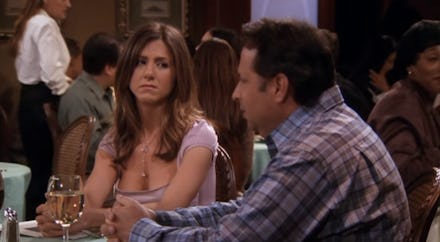Science Reveals Why We End Up Going on So Many Dates We Don't Want To Go On

Turns out humans are really bad at saying "no."
Emily's* first foray into online dating was, like so many other instances of Internet romance, disappointing. The New York resident and recent college grad had been trading messages with a seemingly solid match, but when they met in person, Emily quickly realized the date was a dead end.
The conversation wasn't great, Emily recalls, and despite being a technical "match" online, there was more awkwardness than chemistry. But when Emily had the opportunity to cut the feeble date short, she couldn't bring herself to do it, and instead ended up relocating to a second bar to meet friends... with her suitor in tow. "I didn't have the heart to totally deny him the invite," she said, admitting the weakness of her logic in retrospect.
We head out into the dating world with firm "no scrubs" policies, confident in our ability to reject anyone unworthy. So why do we continually find ourselves agreeing to unwanted rendezvous? A recent study out of the University of Toronto suggests declining a date is far more difficult than we think.
We're not as strong as we think we are. Samantha Joel, a PhD candidate at the University of Toronto specializing in the psychology of romance, conducted the study with male and female undergraduate participants. One group of students was presented with the hypothetical dating profile of an unappealing mate, a profile many were quick to dismiss. But when led to believe the potential paramour was real — and on campus, eager to meet — students in a second group reluctantly agreed to the date, unable to muster a refusal.
"In the abstract, people think, 'Well, if I don't want to date someone, I just won't,'" Joel told Mic. "[But] they don't anticipate when the time comes to turn someone down, that's going to be difficult to do."
"People don't want to hurt other people's feelings, even people they haven't met," she added. Joel noted both men and women were equally reluctant to reject the date.
Joel said the engine behind this phenomenon is an inherent "pro-social" nature we're often unable to overcome. "Relationships have been such important parts of our evolutionary history," she said. "People seemed to underestimate how much this affects their decisions."
Rimma Teper, Joel's coauthor and a postdoctoral fellow at Yale University studying moral behavior and emotions, agrees. "People aren't very good at predicting their behavior in moral dilemmas," Teper said. "They're not very good at predicting how emotional [it's] going to be."
Our good intentions lead to uncomfortable moments. It's a predicament familiar to Megan Ingenbrandt, a 25-year-old public relations specialist from New Jersey. "What's worse — ending up on an awkward date? Or just saying no?" she said.
Before mastering the art of the gentle refusal, Ingenbrandt frequently wound up on the former. "I've often just said 'yes,' and then ended up in situations that I didn't want to be in," she said. "Terrible, awful dates."
And while this kindness may mean one less jilted admirer in the short term, it often just postpones the inevitable. "It's easier to reject a first date than a second date," Joel said. "It's only going to get harder and more painful the more you invest in someone."
Guilt over saying "no" can also lead to another unfortunate behavior: ghosting, the icy practice of ignoring communications wholesale, and without explanation. It may be a simple escape for the ghoster, but it's distressing for the ghostee.
Mercifully, as online dating proliferates and texting becomes our main mode of communication, properly turning down a date becomes a smoother task, says Teper. "My intuition would say it would be a lot easier to reject somebody in an online dating environment," she said. "It's a less emotionally intense experience."
A fill-in-the-blank text response could do the trick, but as Joel and Teper's study reveals, that doesn't necessarily alleviate the guilt. Instead, we might be better off heightening our resolve when we feel that pro-social nature creeping up. A courteous "no" can means one less strained date — and, down the road, one less cold instance of ghosting.
*Some names have been changed.